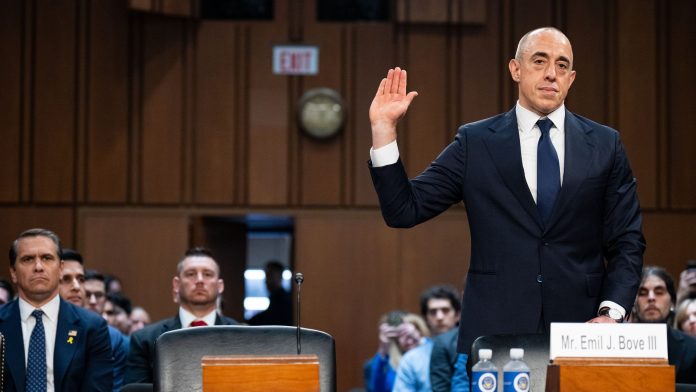President Trump’s nominee to be a circuit court judge in New Jersey is facing allegations of professional misconduct that Democrats contend make him unfit for a lifetime position. A whistleblower complaint sent to Congress alleges Emil Bove told subordinates the Trump administration may need to ignore federal court orders to carry out its immigration agenda.
A controversial figure
This isn’t Bove’s first controversy.
Bove also moved to dismiss federal corruption charges against New York City Mayor Eric Adams, D. The Trump administration was accused of dropping those charges in exchange for Adams’ cooperation with President Trump’s immigration raids.
“We are hearing time and time again from people across the political spectrum and nonpartisan people that this nomination is violative of the shared values we have for who should be on the bench,” said Sen. Cory Booker, D-N.J. “What their temperament should be, what their respect for the rule of law should be.”
Bove says the accusations are false.
“There is a wildly inaccurate caricature of me in the mainstream media. I am not anybody’s henchman, I am not an enforcer,” Bove said during his confirmation hearing on Wednesday, June 25. “I am a lawyer from a small town who never expected to be in an arena like this.”
Here’s what Republicans want you to know about Bove:
- He graduated summa cum laude from Georgetown Law.
- He spent nearly a decade as a federal prosecutor, where he worked on national security and narcotics cases.
- He helped secure a life sentence for the terrorist who detonated bombs in New York City and the Jersey Shore in 2016.
Here’s what Democrats want you to know:
- He was President Trump’s personal defense attorney.
- While at the Justice Department, he fired dozens of career prosecutors who worked on Jan. 6 cases.
- According to a whistleblower, he said the Trump administration may need to ignore court orders to advance its agenda.
Bove denied the whistleblower allegation.
“I have never advised a Department of Justice attorney to violate a court order,” Bove stated.
Bove’s philosophy
Bove’s answer provided insight into his legal philosophy.
“This is fundamentally a dispute about the challenges posed by the unelected bureaucracy to the unitary executive and to the people that elected the president and put him in office,” Bove explained.
“And what I mean by that is throughout this complaint, there is a suggestion that a line attorney, not even the head of the Office of Immigration Litigation, was in a position, or considered himself to be, to bind the department’s leadership and other cabinet officials,” Bove continued. “I don’t abide by that line of thinking in my management style, and I’m not apologetic for that.”
Judiciary Committee Chairman Chuck Grassley, R-Iowa, said some of the rhetoric around Bove has crossed the line. He specifically called out Sen. Adam Schiff, D-Calif., who called Bove a coward and a fool.
“This type of language and this type of personal attack is not appropriate and cheapens the process,” Grassley said. “Turning every nominee into a political punching bag isn’t advice and consent, it’s smear and obstruct.”
Success or failure for Bove?
Historically, the senators who represent the state where the nominee will serve are asked for their approval. If the senators return what’s called a “blue slip,” the nomination can move forward. If the senators withhold the blue slip, typically, the White House finds another candidate. In this case, New Jersey Sens. Cory Booker and Andy Kim, D, opposed Mr. Bove and were in the process of interviewing alternatives proposed by the White House. Bove is moving forward anyway.
A public hearing marks the midway point in a judge’s confirmation process. Bove still needs to be voted out of committee and then get a vote from the full chamber to be confirmed.

